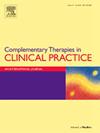Efficacy and safety of olive leaf extract (Olea europaea L.) for glycaemic control in adults with type 2 diabetes mellitus (ESOLED): A pilot randomised controlled trial
IF 2.2
3区 医学
Q2 INTEGRATIVE & COMPLEMENTARY MEDICINE
引用次数: 0
Abstract
Background
Maintaining optimum glycaemic control is essential to reducing comorbidity and mortality in diabetes. However, research indicates that <50 % of patients achieve their target HbA1c ranges. Laboratory studies suggest that olive leaf extract (OLE) may improve glycaemic control, however clinical studies in persons with diabetes are lacking.
Methods
ESOLED is a pilot, randomised, placebo-controlled trial. Adults with a diagnosis of type 2 diabetes of ≥12 months duration, and not receiving insulin therapy, were eligible to participate. Participants were randomised to receive OLE or placebo capsules for 24 weeks. The primary outcome was change in HbA1c. Secondary outcomes included changes in the homeostasis model assessment of insulin resistance, diabetes-related stress, health-related quality of life, and safety.
Results
Thirty-one participants were randomly assigned to the OLE (n = 16) and placebo (n = 15) groups. Analyses found no statistically significant time-group interactions for HbA1c, diabetes-related distress or health-related quality of life. Although participants receiving OLE demonstrated greater improvements in insulin sensitivity than those on placebo, there was no significant difference between groups over time. OLE and placebo were found to be well-tolerated, with no severe or serious adverse events reported in either group.
Conclusion
The ESOLED trial has provided preliminary evidence on the tolerability of OLE in adults with type 2 diabetes, but was inconclusive in determining whether OLE is effective at improving glycaemic control, insulin sensitivity, diabetes-related distress and quality of life. Larger trials and further exploration of the bioavailability of OLE are needed to fully assess the therapeutic potential of OLE in diabetes.
Trial registration
Australian New Zealand Clinical Trials Registry (ACTRN12622000616774).
橄榄叶提取物(Olea europaea L.)对成人2型糖尿病(ESOLED)血糖控制的有效性和安全性:一项随机对照试验
背景:维持最佳血糖控制对于减少糖尿病的合并症和死亡率至关重要。然而,研究表明,方法:ESOLED是一个试点,随机,安慰剂对照试验。诊断为2型糖尿病且持续时间≥12个月且未接受胰岛素治疗的成年人符合参与条件。参与者随机接受OLE或安慰剂胶囊24周。主要终点是HbA1c的变化。次要结局包括胰岛素抵抗、糖尿病相关压力、健康相关生活质量和安全性的动态平衡模型评估的变化。结果:31名参与者被随机分配到OLE组(n = 16)和安慰剂组(n = 15)。分析发现,在HbA1c、糖尿病相关痛苦或与健康相关的生活质量方面,没有统计学上显著的时间组相互作用。虽然接受OLE治疗的参与者在胰岛素敏感性方面比安慰剂组有更大的改善,但随着时间的推移,两组之间没有显著差异。发现OLE和安慰剂耐受性良好,两组均未报告严重或严重不良事件。结论:ESOLED试验为成人2型糖尿病患者OLE的耐受性提供了初步证据,但在确定OLE是否有效改善血糖控制、胰岛素敏感性、糖尿病相关窘迫和生活质量方面尚无定论。为了充分评估OLE在糖尿病中的治疗潜力,需要更大规模的试验和进一步探索OLE的生物利用度。试验注册:澳大利亚新西兰临床试验注册中心(ACTRN12622000616774)。
本文章由计算机程序翻译,如有差异,请以英文原文为准。
求助全文
约1分钟内获得全文
求助全文
来源期刊

Complementary Therapies in Clinical Practice
INTEGRATIVE & COMPLEMENTARY MEDICINE-
CiteScore
6.30
自引率
6.70%
发文量
157
审稿时长
40 days
期刊介绍:
Complementary Therapies in Clinical Practice is an internationally refereed journal published to meet the broad ranging needs of the healthcare profession in the effective and professional integration of complementary therapies within clinical practice.
Complementary Therapies in Clinical Practice aims to provide rigorous peer reviewed papers addressing research, implementation of complementary therapies (CTs) in the clinical setting, legal and ethical concerns, evaluative accounts of therapy in practice, philosophical analysis of emergent social trends in CTs, excellence in clinical judgement, best practice, problem management, therapy information, policy development and management of change in order to promote safe and efficacious clinical practice.
Complementary Therapies in Clinical Practice welcomes and considers accounts of reflective practice.
 求助内容:
求助内容: 应助结果提醒方式:
应助结果提醒方式:


